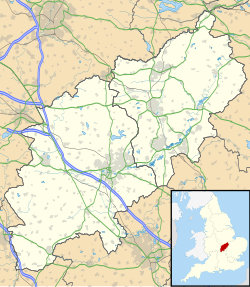| Cranford | |
|---|---|
 | |
Location within Northamptonshire | |
| Population | 422 (2011) |
| OS grid reference | SP9277 |
| Unitary authority | |
| Ceremonial county | |
| Region | |
| Country | England |
| Sovereign state | United Kingdom |
| Post town | Kettering |
| Postcode district | NN14 |
| Dialling code | 01536 |
| Police | Northamptonshire |
| Fire | Northamptonshire |
| Ambulance | East Midlands |
| UK Parliament | |
Cranford is a civil parish in the North Northamptonshire district, in the ceremonial county of Northamptonshire, England. The two settlements in the parish are:
At the time of the 2001 census, the parish population was 414 people, [1] increasing to 422 at the 2011 census. [2]
